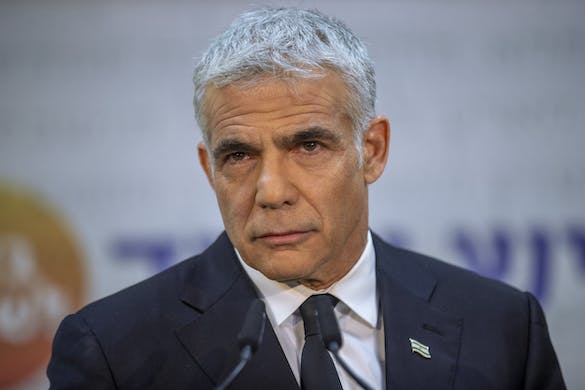Biden Could Follow in Trump’s Footsteps on the Road to Peace Between Israel and Saudi Arabia
Adding Saudi Arabia to the list of Arab countries that signed peace treaties with Israel during the Trump presidency would be a major foreign policy coup for Biden.

In a major about-face, President Biden is warming up to Riyadh. Can the establishment of relations between Saudi Arabia and Israel be far behind? It’s no longer out of the question. Certainly adding Saudi Arabia to the list of Arab countries that signed peace treaties with Israel during Donald Trump’s presidency would be a major foreign policy coup for Mr. Biden.
It would also be a major development in a region where today the United Arab Emirates signed the first free-trade agreement between an Arab country and the Jewish State. For decades Israel was under a pan-Arab boycott. Now the UAE — an ally of Saudi Arabia — is demonstrating how economic and other ties with Israel can benefit all sides.
Even so, as the Israeli foreign minister, Yair Lapid, said today, it could be a while yet before Riyadh is prepared to bring out into the open its clandestine relations with Israel. While widening the Mideast peace circle could indeed bolster Mr. Biden’s foreign policy chops, there are other reasons for the reversal of a policy of shunning a decades-old Arab ally.
High oil prices in world markets following global sanctions against Russia, a major energy producer, have prompted Mr. Biden to expand his search for alternatives. While he canceled oil and gas leases in Alaska and cut down American production, Mr. Biden eased sanctions on Venezuela and courted other potential energy producers around the globe.
A Saudi Arabia rapprochement, in these circumstances, looks ever more logical. So irate were the Saudis about Washington’s endless chiding of them that the Riyadh crown prince, Mohamed bin-Salman, in March declined to take a call from Mr. Biden.
Yesterday, in contrast, Secretary of State Blinken heaped praise on his Saudi counterpart, Prince Faisal bin Farhan al-Saud. The two spoke on the phone about maintaining and extending a ceasefire in Yemen and weighed potential environmental hazards in the Red Sea, according to a State Department readout of the conversation.
“The Secretary and the Foreign Minister also discussed the challenge posed by Iran’s nuclear program and its destabilizing behavior in the region, and opportunities for greater cooperation on regional issues,” the State Department stated.
The warm tone — and even the mere fact that Mr. al-Saud was prepared to speak with Mr. Blinken — would have been almost unthinkable a year ago. In one of his first acts as president, Mr. Biden released a report castigating the Saudi crown prince, known as MbS, for his role in the slaying of a Washington Post columnist, Jamal Khashoggi.
Mr. Biden, who promised to base his foreign policy on human rights, constantly pointed to Riyadh as a top violator. Arms deals were canceled and relations between Washington and Riyadh were at their lowest ebb since 1933, when America established diplomatic ties with the house of Saud.
Now there is ample talk that Mr. Biden is planning to take his first Mideast trip in late June and that it would include only two stops: Saudi Arabia and Israel, which, not so incidentally, were the first two stops in the Middle East on President Trump’s first journey there.
Adding Saudi Arabia to the Trump era’s Abraham Accords, which to date consist of peace treaties between Israel and the UAE, Bahrain, and Morocco, could allow Mr. Biden to declare himself a peacemaker. This is no mere fantasy.
“We believe that it is possible to have a normalization process with Saudi Arabia,” Mr. Lapid said yesterday on Israeli army radio, Galaz. “We’ve already said that this is the next step after the Abraham Accords.” Yet, Mr. Lapid added, it could take “three foreign ministers after me” to complete a peace accord.
The Saudi crown prince’s close relationship with Mr. Trump’s son-in-law, Jared Kushner, went a long way toward the establishment of the Abraham Accords, which was embraced by two of Riyadh’s closest regional allies, the UAE and Bahrain. Israeli sources say that those countries would not have signed on to the deal without a nod from Riyadh’s de facto ruler, MbS.
At the same time, the prince’s father, 86-year-old King Salman, has long stuck to a rejectionist policy of banning relations with Israel before an agreement resolving the Palesitnian question. Israelis widely believe that a peace treaty with Riyadh could be signed quickly once MbS inherits the throne from his father.
Meanwhile, an Israeli business newspaper, Globes, reported Sunday that dozens of business executives and entrepreneurs visited Saudi Arabia recently with their Israeli passports, receiving special entry visas.
The unprecedented trip signaled an expansion of clandestine relations, including military, intelligence, and scientific exchanges, which have grown between the two countries despite the absence of formal ties. Mr. Biden may not be able to convince the Saudis to pump more oil than their preferred target, but he might be satisfied with the consolation prize of following in Mr. Trump’s footsteps.

